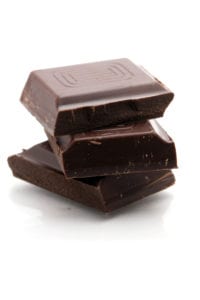Written by Harold Oster, MD. Results suggest that 85% dark chocolate has a beneficial effect on negative mood states and gut microbial diversity.
 Major depression is a common illness worldwide, with a lifetime risk as high as 20%. The causes of depression have not been fully elucidated, and different mechanisms may contribute1. The gastrointestinal microbiome may play a role in mood disorders, including depression, through its effects on the autonomic nervous system and the hypothalamic-pituitary axis. Increased bacterial diversity in the fecal flora has been shown to have health benefits2. Cocoa may have a beneficial effect on negative mood3 and has been shown to affect the gut microbiome4.
Major depression is a common illness worldwide, with a lifetime risk as high as 20%. The causes of depression have not been fully elucidated, and different mechanisms may contribute1. The gastrointestinal microbiome may play a role in mood disorders, including depression, through its effects on the autonomic nervous system and the hypothalamic-pituitary axis. Increased bacterial diversity in the fecal flora has been shown to have health benefits2. Cocoa may have a beneficial effect on negative mood3 and has been shown to affect the gut microbiome4.
Ji-Hee Shin et al. studied the effects of 70% and 85% dark chocolate on the mood states and the gut microbiome of healthy adults. Forty-eight non-depressed participants between twenty and thirty years of age were recruited at a university in Seoul, Korea and randomized into three groups. Fourteen participants received no chocolate, 18 received 10g of 85% dark chocolate to take three times a day for three weeks, and 16 received 10g of 70% chocolate to take three times a day for the same duration. Mood was tested at the beginning and end of the study by the Positive and Negative Affect Schedule, a validated twenty-item self-reported survey evaluating positive and negative mood states5. Participants were evaluated for body mass index, fat mass, and muscle mass at the beginning and end of the study. Standard three-day dietary assessments were completed. Fecal samples collected at the beginning and end of the study were tested for bacterial diversity and composition.
The authors noted the following:
- No significant differences were found in the dietary surveys or anthropometric parameters in the three groups throughout the study.
- On the Positive and Negative Affect Schedule, the group that consumed 85% dark chocolate improved on scores for negative affect.
- Fecal bacterial diversity increased in the group that consumed 85% dark chocolate.
- Fecal levels of Blautia obeum increased, and levels of Faecalibacterium prausnitzii decreased in the 85% chocolate group compared to controls. These bacteria are abundant in normal adults and have been shown to be factors in human health6,7.
Results of the study suggest that 85% dark chocolate may improve negative mood states in healthy adults, change the concentrations of normal fecal bacterial constituents, and increase the overall diversity of the gut microbiome. Limitations of the study include the lack of a placebo in the control group and the lack of blinding of the participants.
Source: Shin, Ji-Hee, Chong-Su Kim, Lina Cha, Sojeong Kim, Seokoh Lee, Suyeon Chae, Woo Young Chun, and Dong-Mi Shin. “Consumption of 85% cocoa dark chocolate improves mood in association with gut microbial changes in healthy adults: a randomized controlled trial.” The Journal of nutritional biochemistry 99 (2022): 108854.
© 2021 The Author(s). Published by Elsevier Inc. This is an open access article under the CC BY-NC-ND license (http://creativecommons.org/licenses/by-nc-nd/4.0/)
Click here to read the full text study.
Posted October 19, 2023.
Harold Oster, MD graduated from medical school in Miami, Florida in 1992 and moved to Minnesota in 2004. After more than 25 years of practicing Internal Medicine, he recently retired. Dr. Oster is especially interested in nutrition, weight management, and disease prevention. Visit his website at haroldoster.com.
References:
- Malhi GS, Mann JJ. Depression. Lancet. Nov 24 2018;392(10161):2299-2312. doi:10.1016/s0140-6736(18)31948-2
- Hills RD, Jr., Pontefract BA, Mishcon HR, Black CA, Sutton SC, Theberge CR. Gut Microbiome: Profound Implications for Diet and Disease. Nutrients. Jul 16 2019;11(7)doi:10.3390/nu11071613
- Scholey A, Owen L. Effects of chocolate on cognitive function and mood: a systematic review. Nutr Rev. Oct 2013;71(10):665-81. doi:10.1111/nure.12065
- Sorrenti V, Ali S, Mancin L, Davinelli S, Paoli A, Scapagnini G. Cocoa Polyphenols and Gut Microbiota Interplay: Bioavailability, Prebiotic Effect, and Impact on Human Health. Nutrients. Jun 27 2020;12(7)doi:10.3390/nu12071908
- Crawford JR, Henry JD. The positive and negative affect schedule (PANAS): construct validity, measurement properties and normative data in a large non-clinical sample. Br J Clin Psychol. Sep 2004;43(Pt 3):245-65. doi:10.1348/0144665031752934
- Liu X, Mao B, Gu J, et al. Blautia-a new functional genus with potential probiotic properties? Gut Microbes. Jan-Dec 2021;13(1):1-21. doi:10.1080/19490976.2021.1875796
- Moosavi SM, Akhavan Sepahi A, Mousavi SF, Vaziri F, Siadat SD. The effect of Faecalibacterium prausnitzii and its extracellular vesicles on the permeability of intestinal epithelial cells and expression of PPARs and ANGPTL4 in the Caco-2 cell culture model. J Diabetes Metab Disord. Dec 2020;19(2):1061-1069. doi:10.1007/s40200-020-00605-1
